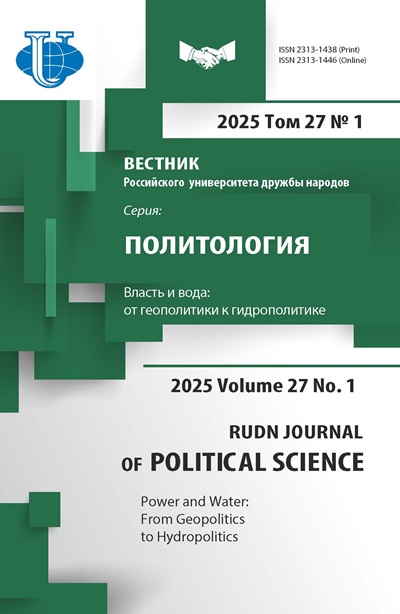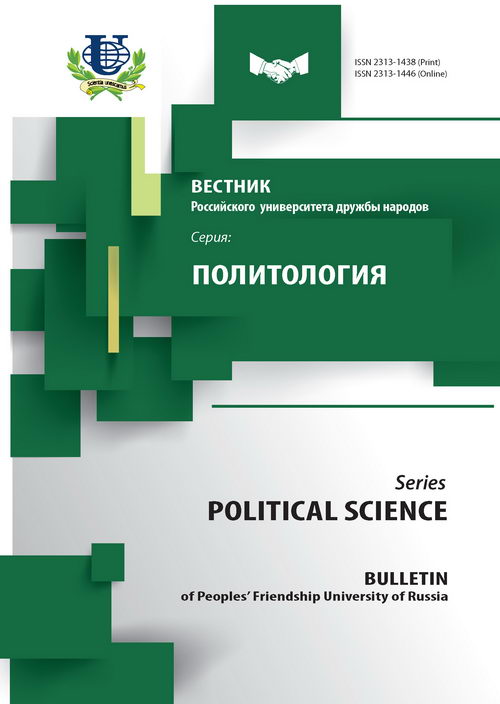No 3 (2015)
- Year: 2015
- Articles: 14
- URL: https://journals.rudn.ru/political-science/issue/view/565
- DOI: https://doi.org/10.22363/2313-1438-2015-3
ARTICLES and REVIEWS
«Charts Power» - International Ratings as an Economic Weapon and a Tool of Soft Power. Part II
Abstract
In the given article, the authors propose and operationalize the notion of “charts power” (or “index power”, “ratings power”) as a significant component of soft power of national states and international institutions. The authors prove that numerous comparative ratings of different countries that have become extremely popular in recent decades could be used as an economic weapon and an effective tool of influence. The article analyses the mechanisms of ratings power and emergence of “rating thinking”. The authors conclude about the importance of actual and potential threats to national security of the Russian Federation from charts power of the foreign states.
 7-34
7-34


The Problems and Prospects of Rating Assessment of Political Stability
Abstract
The article is devoted to the analysis of principles of qualitative and quantitative approaches to measurement of political stability. The author gives a detailed analysis of the problems and prospects of ratings and indices as tools of political analysis and measurement of political stability.
 35-46
35-46


Russian Political Accents of Contemporary Religious and Secular Relations
Abstract
The article deals with contemporary political trends related to new forms of relationship between the secular and religious spheres of society. The focus is on the specifics of the Russian manifestation of the religious factor in politics, as well as the attitude of Russians to the inclusion of the religious component in the socio-political space.
 47-56
47-56


Public Projects of Roman Catholic Church in Russia
Abstract
The article analyses some features of non-liturgical activity of Catholic Church, which are related to the arrangement and the occupation of catholic orders, to the arrangement of laity's association, to publishing and educational activities.
 57-63
57-63


Autocephalous Trends in Ukrainian Church: Historical-Political View
Abstract
In this article, the author analyses the causes of the Autocephalous movement in Ukraine on the basis of memoirs of Metropolitan Benjamin (Fedchenkov). The activities of the Local Council Orthodox of Moscow of 1917-1918, and its decisions regarding the status of the Ukrainian Orthodox Church are analyzed. The influence of the Ukrainian nationalist movements on the work of Church Councils in Kiev in 1918 and 1921 is described in the article.
 64-70
64-70


The Political Activity in the Network Environment
Abstract
The rapid development and deep penetration into all areas of modern society of information and communication technologies significantly increase the role of network interactions. Network structures represented primarily social networks, embedded in the public policy process and became one of the key political actors. Online communities take the form of public policy, where the formation of public opinion and political decision-making plays the main role. Networking environment opens up new opportunities for the opposition and protest movements, civic participation, and control of public policy in general. The article gives an insight on the political aspects of social networking, concludes on the trend formation and network's strengthening of the political activity in a wide distribution of e-networking and e-communications.
 71-81
71-81


Measurements of Communication Links of Modern Political Communication in Internet
Abstract
The article investigates the ways to measure the communication links in political networks. The author considers the new technologies that analyze user data and build graphs with nodes. Much attention is paid to the development of Internet measurement in the field of political communications.
 82-85
82-85


Armenia: Nation-Building, Imperial Practices and Ethnic Nationalism as Means of Survival
Abstract
The article is devoted to the phenomenon of hybrid political space of post-Soviet Armenia, combining institutions of the nation state and the imperial practices. In the article, the author analyzes the experience of building a modern state in Armenia on the basis of security concerns and as an actor in international politics. In this context the hybrid political space, allow to face foreign and domestic challenges. However, such a hybrid system leads to the erosion of state and the expansion of traditional (pre-modern) practices.
 86-97
86-97


Perspectives of Armenia in Eurasian Economic Union
Abstract
This article examines the problems and perspectives of post-soviet integration processes, on the example of Armenia’s accession to the Eurasian Union. The main political and economic grounds for Armenia’s accession to the Union are pointed out in the article. This research, through the elements of the method of SWOT analysis, reviews scenarios of possible developments around Armenia and the Eurasian Union. The author concludes that Armenia’s accession to the Eurasian Union is a mutually beneficial geopolitical, geostrategic step, which may promote the post-soviet integration processes.
 98-105
98-105


Foreign Policy of The United States Against the Global Powers and Regional Actors: Case Study “Russian Federation” and “The Islamic Republic of Iran”
Abstract
The article examines US foreign policy strategy toward the global powers and regional actors in the post-bipolar period. The aim of the article is to demonstrate the theoretical and scientific significance of the concept of balance in the structure of international relations in the post-bipolar period, by defining behaviors of US against Russia and Iran. The results of the research show that US foreign policy toward Russia and Iran in the short term based on a soft balance, and in the long term - on the depletion of power.
 106-117
106-117


Salafis in Political Life of Egypt
Abstract
In today's world Salafism, which has evolved from insignificant and apolitical to the very influential movement is the subject of active discussion. This article discusses and analyzes the historical background, the conditions of formation and propagation of Salafi movement in Egypt. In addition, the author disclosed the role and the place of this movement in modern political life of Egypt.
 118-127
118-127


The Competition State Today: from the National to the Global Interests
Abstract
The Competition State is often defined as an advanced state taking control of the economy as a basis for ensuring the establishment of a competitive market environment, rather than the planned and command intervention. Such a state becomes an agent of global competition. According to P. Cerny, the market-oriented environment is the main requirement for the achievement of economic growth for country seeking to develop its social policy. Today, the purpose of government intervention is to create a well-functioning market, and state support of competition is an important mean of achieving this goal.
 128-137
128-137


The State of Research of Political Culture in China
Abstract
The problem of research of political culture in modern China in relation to global trends is studied in the article. In particular, the author analyzes the history and causes of formation of various research approaches to traditional Chinese political culture and political culture in general. Researches of political culture of China by Russian scientists is not very detailed. The author sets a goal to acquaint the Russian scientific community with modern research of political culture of China by Chinese scientists.
 138-142
138-142


On Our Authors
 143-144
143-144
















